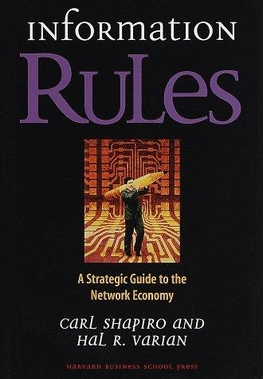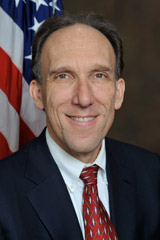
In economics, a network effect is the phenomenon by which the value or utility a user derives from a good or service depends on the number of users of compatible products. Network effects are typically positive feedback systems, resulting in users deriving more and more value from a product as more users join the same network. The adoption of a product by an additional user can be broken into two effects: an increase in the value to all other users and also the enhancement of other non-users' motivation for using the product.
Standardization or standardisation is the process of implementing and developing technical standards based on the consensus of different parties that include firms, users, interest groups, standards organizations and governments. Standardization can help maximize compatibility, interoperability, safety, repeatability, or quality. It can also facilitate a normalization of formerly custom processes.

George Arthur Akerlof is an American economist and a university professor at the McCourt School of Public Policy at Georgetown University and Koshland Professor of Economics Emeritus at the University of California, Berkeley. Akerlof was awarded the 2001 Nobel Memorial Prize in Economic Sciences, jointly with Michael Spence and Joseph Stiglitz, "for their analyses of markets with asymmetric information."
Information goods are commodities that provide value to consumers as a result of the information it contains and refers to any good or service that can be digitalized. Examples of information goods includes books, journals, computer software, music and videos. Information goods can be copied, shared, resold or rented. Information goods are durable and thus, will not be destroyed through consumption. As information goods have distinct characteristics as they are experience goods, have returns to scale and are non-rivalrous, the laws of supply and demand that depend on the scarcity of products do not frequently apply to information goods. As a result, the buying and selling of information goods differs from ordinary goods. Information goods are goods whose unit production costs are negligible compared to their amortized development costs. Well-informed companies have development costs that increase with product quality, but their unit cost is zero. Once an information commodity has been developed, other units can be produced and distributed at almost zero cost. For example, allow downloads over the Internet. Conversely, for industrial goods, the unit cost of production and distribution usually dominates. Firms with an industrial advantage do not incur any development costs, but unit costs increase as product quality improves.

Information economy is an economy with an increased emphasis on informational activities and information industry, where information is valued as a capital good. The term was coined by Marc Porat, a graduate student at Stanford University, who would later co-found General Magic.
The Walter A. Haas School of Business is the business school of the University of California, Berkeley, a public research university in Berkeley, California. It was the first business school at a public university in the United States.

Laura D'Andrea Tyson is an American economist and university administrator who is currently a Distinguished Professor of the Graduate School at the Haas School of Business of the University of California, Berkeley and a senior fellow at the Berggruen Institute. She served as the 16th Chair of the White House Council of Economic Advisers from 1993 to 1995 and 2nd Director of the National Economic Council from 1995 to 1996 under President Bill Clinton. Tyson was the first woman to hold each of those posts. She remains the only person to have served in both posts.

Hal Ronald Varian is Chief Economist at Google and holds the title of emeritus professor at the University of California, Berkeley where he was founding dean of the School of Information. Varian is an economist specializing in microeconomics and information economics.

David John Teece is a New Zealand-born US-based organizational economist and the Professor in Global Business and director of the Tusher Center for the Management of Intellectual Capital at the Walter A. Haas School of Business at the University of California, Berkeley.
Although information has been bought and sold since ancient times, the idea of an information marketplace is relatively recent. The nature of such markets is still evolving, which complicates development of sustainable business models. However, certain attributes of information markets are beginning to be understood, such as diminished participation costs, opportunities for customization, shifting customer relations, and a need for order.
The network economy is the emerging economic order within the information society. The name stems from a key attribute - products and services are created and value is added through social networks operating on large or global scales. This is in sharp contrast to industrial-era economies, in which ownership of physical or intellectual property stems from its development by a single enterprise. Business models for capturing ownership rights for value embedded in products and services created by social networks are being explored.
A patent thicket is "an overlapping set of patent rights" which requires innovators to reach licensing deals for multiple patents. This concept is associated with negative connotations and has been described as "a dense web of overlapping intellectual property rights that a company must hack its way through in order to actually commercialize new technology".
Franklin Marvin Fisher was an American economist. He taught economics at the Massachusetts Institute of Technology from 1960 to 2004.

Information Rules is a 1999 book by Carl Shapiro and Hal Varian applying traditional economic theories to modern information-based technologies. The book examines commercial strategies appropriate to companies that deal in information, given the high "first copy" and low "subsequent copy" costs of information commodities, such as music CDs or original texts.
Donald Frank Turner was an American antitrust attorney, economist, legal scholar and educator who spent most of his career teaching at Harvard Law School. He was also Assistant Attorney General in charge of the Antitrust Division from 1965 to 1968.
Suzanne Scotchmer was an American professor of law, economics and public policy at the University of California, Berkeley and also a noted author on many economic subjects. She earned her B.A. from University of Washington magna cum laude in 1970, her M.A. in statistics from UC Berkeley in 1979, and her PhD in economics from UC Berkeley in 1980.
Adam B. Jaffe is a freelance economist working in Boston, Massachusetts. He was previously Director of Motu Economic and Public Policy Research, in Wellington, New Zealand and a professor of economics at Brandeis University. His areas of expertise include industrial organization, technological change and innovation, law and economics, and environmental economics. The overarching theme of his work is focused on the process of technological change and innovation.
Richard J. Gilbert is an American Economist, professor at UC Berkeley from 1976 to 2000, and founder of LECG Corp.. Richard ('Rich') Gilbert served as Deputy Assistant General in the Antitrust Division of the U.S. Department of Justice in the White House from 1993 to 1995, and author of Innovation Matters: Competition Policy for the Knowledge Economy, published by M.I.T. Press. While serving for the United States Justice Department, Richard Gilbert led the development of Joint Department of Justice and Federal Trade Commission Antitrust Guidelines for the Licensing of Intellectual Property. Currently Distinguished Professor Emeritus of Economics at the University of California at Berkeley, Richard Gilbert was president of the Industrial Organization Society at University of California, Berkeley during his tenure and from 2002 to 2005 the Chair of the Economics department there. Professor Gilbert has taken special interest in Innovation, Organizational behavior, and Energy economics. Richard J. Gilbert now works as Emeritus from the University, as a consultant for Compass Lexicon and was on the Board of the East Bay College Fund Oakland Promise Association.







